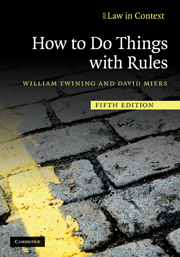Book contents
- Frontmatter
- Contents
- Preface
- Online appendices
- Acknowledgements
- Abbreviations
- Table of statutes and legislative instruments
- Table of cases
- Part I
- Part II Reading, using and interpreting rules in general
- Part III Reading law: reading, using and interpreting legislation and cases
- 6 Routine and problematic readings
- 7 Legislation
- 8 Interpreting legislation
- 9 Reading cases
- 10 The European dimension
- 11 Rules, reasoning and interpretation
- Part IV
- Index
- Resources on the web
- References
8 - Interpreting legislation
Published online by Cambridge University Press: 05 June 2012
- Frontmatter
- Contents
- Preface
- Online appendices
- Acknowledgements
- Abbreviations
- Table of statutes and legislative instruments
- Table of cases
- Part I
- Part II Reading, using and interpreting rules in general
- Part III Reading law: reading, using and interpreting legislation and cases
- 6 Routine and problematic readings
- 7 Legislation
- 8 Interpreting legislation
- 9 Reading cases
- 10 The European dimension
- 11 Rules, reasoning and interpretation
- Part IV
- Index
- Resources on the web
- References
Summary
Laws are made for men of ordinary understanding, and should, therefore, be construed by the ordinary rules of common sense.
In the area of statutory construction, context is critical.
Statutory provisions are read, used and interpreted by a wide variety of people: judges, magistrates and their clerks, members of tribunals, police officers, civil servants, officials in local authorities and other public bodies, employees in the privatised industries, trade union officials, architects, chartered surveyors, accountants, barristers, solicitors, shopkeepers, employers, students and others. For many of these the application of a statutory provision in a given instance will usually be a routine matter. Where doubts do arise about its scope or meaning, or about its relationship with other provisions, they may often be easily resolved, for example by reference to an authoritative ruling or text, or to some technique of interpretation supplied by the context. However, not all doubts are so easily resolved. This chapter applies the approach outlined in Chapter 6 to the identification of conditions of doubt in the interpretation of statutes and the construction of arguments for and against alternative answers. Where appropriate, points will be illustrated, among other sources, by reference to Davis v Johnson. In the fourth edition we presented the results of a review of the cases reported in the All England Law Reports for 1998 as a means of illustrating the scope of judicial approaches to the interpretation of statutes.
- Type
- Chapter
- Information
- How to Do Things with Rules , pp. 230 - 267Publisher: Cambridge University PressPrint publication year: 2010



